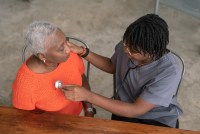Latest KFF Health News Stories
To Protect a Mother’s Health: How Abortion Ban Exemptions Play Out in a Post-‘Roe’ World
Florida’s six-week abortion law allows exemptions in cases of rape, incest, and human trafficking, and to save the health or life of the mother. But the recent history of such exemptions in other states suggests that very few women will be able to take advantage of them.
Black, Rural Southern Women at Gravest Risk From Pregnancy Miss Out on Maternal Health Aid
A federal program meant to reduce maternal and infant mortality in rural areas isn’t reaching Black women who are most likely to die from pregnancy-related causes.
As Fewer MDs Practice Rural Primary Care, a Different Type of Doctor Helps Take Up the Slack
The number of DOs is surging, and more than half of them practice in primary care, including in rural areas hit hard by doctor shortages.
More States OK Postpartum Medicaid Coverage Beyond Two Months
Montana, Alaska, Mississippi, Missouri, South Dakota, Texas, Utah, and Wyoming are among the latest states moving to provide health coverage for up to a year after pregnancy through the federal-state health insurance program for low-income people.
Cardiovascular Disease Is Primed to Kill More Older Adults, Especially Blacks and Hispanics
Cardiovascular disease is the biggest killer of older Americans, with Black and Hispanic people at higher risk. Despite medical advances, researchers say, disparities are expected to worsen in the coming decades.
La enfermedad cardiovascular podría matar a más adultos mayores hispanos
El dramático envejecimiento de la población de Estados Unidos y el número creciente de personas con afecciones como hipertensión, diabetes y obesidad —que aumentan el riesgo cardíaco— se espera que contribuyan a este escenario alarmante.
A Striking Gap Between Deaths of Black and White Babies Plagues the South
Infant mortality rates across the South are by far the worst in the U.S. A look at South Carolina — where multimillion-dollar programs aimed at improving rates over the past 10 years have failed to move the needle — drives home the challenge of finding solutions, especially in rural communities.
Fresh Produce Is an Increasingly Popular Prescription for Chronically Ill Patients
Fresh produce prescription programs are getting a boost in Montana as a way of helping people with chronic conditions such as diabetes and high blood pressure. The approach may be a model for other rural states to promote healthy eating in food deserts.
NYC Makes Clear Its Intent to Lead on Abortion Access
Mayor Eric Adams’ announcement this year to provide abortion pills free of charge at four of New York’s sexual health clinics is the city’s latest move on abortion access. Other jurisdictions are also taking steps.
In Tennessee, a Medicaid Mix-Up Might Land You on a ‘Most Wanted’ List
Tennessee posts the names and photos of people arrested for alleged Medicaid fraud on a government website and social media. Some people even wind up on a “most wanted” list.
Cleanup Workers Got Sick After Deepwater Horizon Oil Spill. They Want BP to Pay.
After the BP Deepwater Horizon oil spill in 2020, Rodney Boblitt’s job was to patrol a 14-mile stretch of coastline in the Florida Panhandle looking for signs of oil washing ashore. Today, the 54-year-old is among thousands of other cleanup workers who are experiencing health issues and suing BP. But proving their health conditions were caused by the oil has been challenging.
Transgender People in Rural America Struggle to Find Doctors Willing or Able to Provide Care
Many health professionals in rural areas don’t know how to provide gender-affirming care, leaving transgender patients with few options.
Hospitals’ Use of Volunteer Staff Runs Risk of Skirting Labor Laws, Experts Say
Hospitals using volunteers is commonplace. But some labor experts argue that deploying unpaid workers to do work that benefits the organization’s bottom line lets for-profit hospitals skirt federal labor laws, deprives employees of work, and potentially exploits the volunteers.
More Orthopedic Physicians Sell Out to Private Equity Firms, Raising Alarms About Costs and Quality
While some doctors seem eager for a huge payoff, others are warily watching what happens when private equity firms take charge of orthopedic practices.
Hundreds of Hospitals Sue Patients or Threaten Their Credit, a KHN Investigation Finds. Does Yours?
An examination of billing policies and practices at more than 500 hospitals across the country shows widespread reliance on aggressive collection tactics.
More States to Consider Extending Postpartum Medicaid Coverage Beyond Two Months
Fifteen states haven’t moved to extend Medicaid coverage for new moms beyond the minimum of 60 days after birth. But at least four of those holdout states — Montana, Wyoming, Missouri, and Mississippi — are expected to consider proposals to extend coverage in their upcoming legislative sessions.
Patient Mistrust and Poor Access Hamper Federal Efforts to Overhaul Family Planning
For decades, many women of color, particularly those with low incomes, had little control over their family planning care. Now, a White House effort aims to give patients more choices as abortion care evaporates, but patients remain wary of providers.
Cómo el optimismo puede cerrar la brecha de cobertura de Medicaid
Más de 2 millones de personas de bajos ingresos, la mitad de ellos en Florida y Texas, no tienen seguro porque están atrapados en una brecha de cobertura. Y sus estados no han expandido Medicaid.
How Optimism Can Close the Medicaid Coverage Gap
Low-income residents in states that haven’t expanded Medicaid are in a tough spot: They don’t qualify for the subsidies that people with slightly higher incomes get to buy marketplace plans because of a glitch in the federal health law. But a court decision last year makes it easier for them to make good-faith estimates of a pay increase, and there is no financial penalty if they don’t hit that figure.
Stopping the Churn: Why Some States Want to Guarantee Medicaid Coverage From Birth to Age 6
Oregon has become the first state to allow kids to stay in the government health care program from birth to age 6, no matter if their household income changes. California, Washington, and New Mexico are pursuing similar policies.
























